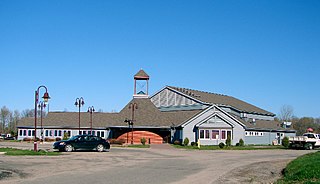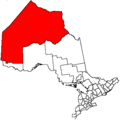
Kenora, previously named Rat Portage, is a city situated on the Lake of the Woods in Ontario, Canada, close to the Manitoba boundary, and about 210 km (130 mi) east of Winnipeg by road. It is the seat of Kenora District.

The Treaty of Saginaw, also known as the Treaty with the Chippewa, was made between Gen. Lewis Cass and Chief Mash Kee Yosh, Chief John Okemos, Chief Wasso and other Native American tribes of the Great Lakes region in what is now the United States, on September 24, 1819, proclaimed by the President of the United States on March 25, 1820, and placed in law as 7 Stat. 203.

Kettle & Stony Point First Nation comprises the Kettle Point reserve and Stony Point Reserve, both located approximately 35 kilometres (22 mi) northeast of Sarnia, Ontario, Canada, on the southern shore of Lake Huron. The reserves serve as the land base for the Chippewas (Anishnaabeg) of Kettle and Stony Point First Nation.

The Anishinaabe are a group of culturally related Indigenous peoples in the Great Lakes region of Canada and the United States. They include the Ojibwe, Odawa, Potawatomi, Mississaugas, Nipissing, and Algonquin peoples. The Anishinaabe speak Anishinaabemowin, or Anishinaabe languages that belong to the Algonquian language family.
First Nations in Ontario constitute many nations. Common First Nations ethnicities in the province include the Anishinaabe, Haudenosaunee, and the Cree. In southern portions of this province, there are reserves of the Mohawk, Cayuga, Onondaga, Oneida, Seneca and Tuscarora.
Treaty 3 was an agreement entered into on October 3, 1873, by Chief Mikiseesis on behalf of the Ojibwe First Nations and Queen Victoria. The treaty involved a vast tract of Ojibwe territory, including large parts of what is now northwestern Ontario and a small part of eastern Manitoba, to the Government of Canada. Treaty 3 also provided for rights for the Waasaakode Anishinaabe and other Ojibwe, through a series of agreements signed over the next year. The treaty was modified in 1875 when Nicolas Chatelain negotiated an adhesion that created a reserve, surveyed as reserve 16A, for Metis families connected to Mikiseesis' Rainy Lake Band. Reserve 16A and the Rainy Lake Band reserve were unified in 1967.
Cat Lake First Nation is an Ojibway First Nation reserve approximately 180 kilometres northwest of Sioux Lookout in northwestern Ontario, Canada, located on the central north shore of Cat Lake. As of 2021, their total registered population was 651 people.
The Anishinaabe, like most Algonquian-speaking groups in North America, base their system of kinship on clans or totems. The Ojibwe word for clan was borrowed into English as totem. The clans, based mainly on animals, were instrumental in traditional occupations, intertribal relations, and marriages. Today, the clan remains an important part of Anishinaabe identity. Each clan is forbidden from harming its representation animal by any means, as it is a bad omen to do so.
CKWO-FM is a Canadian radio station that airs pop rock and aboriginal/First Nations community radio programming broadcasting at 101.3 FM in Wauzhushk Onigum Nation, Ontario in the Kenora area. The station is known on the air as The Gap, which began broadcasting in 2024 and is owned by WONation Radio Inc.

Fort William First Nation is an Ojibwa First Nation reserve in Ontario, Canada. The administrative headquarters for this band government is south of Thunder Bay. As of January 2008, the First Nation had a registered population of 1,798 people, of which their on-Reserve population was 832 people.

The Couchiching First Nation is a Saulteaux First Nation band government in the Canadian province of Ontario, who live on the Couchiching 16A and Agency 1 reserves in the Rainy River District near Fort Frances.
Grand Council of Treaty 3 (GCT3) is a political organization representing 24 First Nation communities across Treaty 3 areas of northern Ontario and southeastern Manitoba, Canada, and four additional First Nations, specifically in regard to their Treaty rights.
The Bingwi Neyaashi Anishinaabek is an Ojibwe First Nation Band government in Northwestern Ontario, Canada.

Nipissing First Nation, meaning "place of little waters", is a long-standing community of Nishnaabeg peoples, who traditionally speak Anishinaabemwin, located along the shorelines of Lake Nipissing in northern Ontario. They are referred to by many names in European historical records, since the colonists often adopted names given to them by other nations.
The Naicatchewenin First Nation, also known as the Anishinaabeg of Nagaajiwanaang and formerly known as Northwest Bay First Nation, inhabited a region in Ontario that was cited in the Northwest Angle Treaty of 1873, also known as Treaty 3. Nagaajiwanaang is located approximately 60 kilometres (37 mi) northwest of Fort Frances, with the community of Devlin 50 kilometres (31 mi) to the south on Highway 11. The city of Thunder Bay lies 420 kilometres (260 mi) to the east and Winnipeg is 450 kilometres (280 mi) to the northwest.
Big Grassy First Nation is an Ojibwe or Ontario Saulteaux First Nation band government located in Rainy River District, Ontario near Morson, Ontario.
Onigum is an unincorporated community in Shingobee Township, Cass County, Minnesota, United States, near Walker, along Cass County Road 13. The name Onigum means "portage" in the Ojibwe language.
The Anishinabeg of Kabapikotawangag Resource Council is a First Nations tribal council in Ontario and Manitoba. It is part of the Grand Council of Treaty 3, and includes the Animakee Wa Zhing 37 First Nation, Big Grassy First Nation, the Anishnaabeg of Naongashiing, the Northwest Angle 33 First Nation, the Ojibways of Onigaming First Nation and the Anishinabe of Wauzhushk Onigum.
Rat Portage 38B is a First Nations reserve on Lake of the Woods in Kenora District, Ontario. It is one of the reserves of the Anishinabe of Wauzhushk Onigum.
Agency 30 is a First Nations reserve on the Aulneau Peninsula of Lake of the Woods in northwestern Ontario. It is shared by 13 First Nations:







